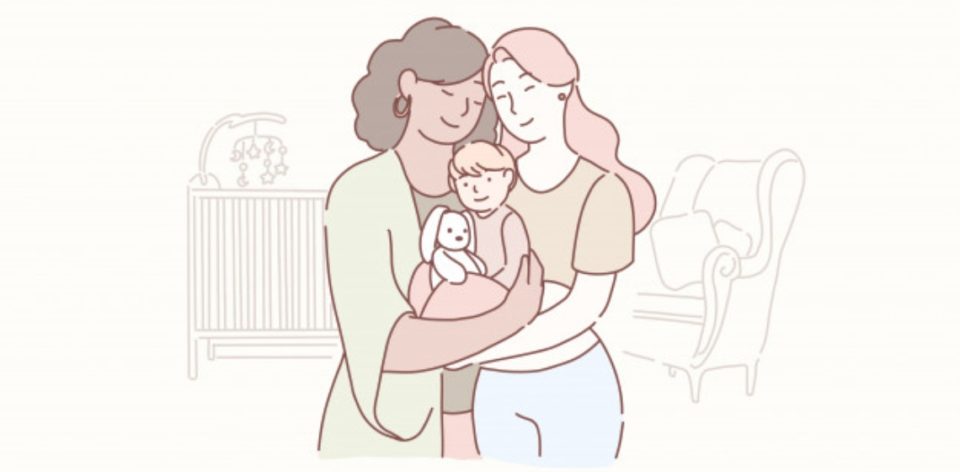Soon even more children will grow up in state care and end up in adoptive families abroad due to the recently submitted anti-family package of proposals. 11 non-governmental organizations are speaking out against this on November 20th, World Children’s Day.
The day before the start of the lockdown, Judit Varga, Hungary’s Minister of Justice, submitted a package of bills, the main victims of which will be the children awaiting adoption. They all deserve to grow up in a loving family, but the governement would like to make it impossible for single people—as well as those living in relationships with life partners or in same-sex relationships—to adopt, thereby reducing the number of people eligible to adopt. The 11 NGOs signing this letter call on Parliament to put the interest of children first and reject this bill.
The state is not a good parent. Serious child abuse is not rare in state care institutions: although public advocates uncovered physical and mental abuse, torture, and violence in children’s homes in Göd, Kalocsa, Zalaegerszeg and Esztergom, this was not followed by a change. According to experts, a group home or orphanage cannot give the necessary attention and emotional security for children’s development even if the above such crimes do not take place as in the four previously mentioned institutes. Therefore, it is in the interest of each child not to grow up in such institutes, but rather in families or in community care, which is in line with the UN’s and the European Commission’s guidelines.
Previously, professional organizations decided who could become adoptive parents after psychological and environmental tests. After the decision of permission, the prospective adoptive parents were required to attend a course as well. However, in the spring the government made a hitherto mandatory course into just a recommended course in order to “facilitate adoption”, despite protests from several children’s rights organizations. Half a year after adopting this proposal which lacked professional support the government is taking steps in the opposite direction which will make adoptions in the future even more difficult and inaccessible. In October, the restrictions on adoption for single parents were already tightened: a child can only be recommended to a single parent if there are no marrired couples on neither the county nor the national list who would adopt. This decision already goes against the position of the child protection ombudsman and the Commissioner of Fundamental Rights, according to whom keeping the child in the place of residence, or at least within the county, should take precedence over placement with married couples. In addition to prolonging the procedure and delaying adoption, the legistlation also ignores th fact that people living in single or non-marital relationships can provide a loving home for their child. We consider it particularly harmful and worrying from the point of view of children’s rights that the decision would be taken out of the hands of experts by the government in the case of single adopters and entrusted to a politician, the Minister for Families of Katalin Novák.
Based on the political rhetoric and the homophobic speeches of the leading pro-governement politicians in recent years, there is no doubt that prejudices against rainbow families are behind the package of proposals. Such stereotypes which are objectivley rejected by professionals: no scientifically based and recognized research suggests that children of same-sex parents are at a disadvantage in any way compared to children of heterosexual couples. A new campaign by the Háttér Society (Háttér Társaság) and the rainbow families’ community also draws attention to this.
Today in Hungary many children remain in state care or end up with adoptive parents abroad. Such children, who Hungarian couples or single people would happily raise, but cannot. According to research by Háttér Society and the Hungarian Academy of Science, gay and lesbian couples would adopt a much higher proportion of children who are not chosen by heterosexual couples. For example, children older than three years or children who have some kind of characteristic which is considered disavantageous. Moreover, while in many other countries the legislature strives to allow all children to grow up in a family, in Hungary the possibility of this is constantly being reduced—judging the children’s perspective as secondary.
The proposal package—beyond disproportionately complicating adoption—would further undermine the rights of trans and intersex children. The Parliament in the spring already adopted a law banning the legal recognition of trans and intersex people which forces those concerned to live their daily lives with documents that do not match their identity and/or appearance and includes the stigmatization of trans people into the basic law.
Family is family and children are children; all children should have the same rights. This was emphasized this morning by the Council of Europe’s Commisioner for Human Rights, Dunja Mijatovic, calling on the Hungarian Pariliament to postpone the vote on the proposals. The 11 undersigned NGOs, in line with the position of the Council of Europe, call on the Parliament not to accept the package of proposals, the primary victims of which will be Hungarian Children.
Signatories:
- Amnesty International Magyarország
- Budapest Pride
- Háttér Társaság
- Labrisz Leszbikus Egyesület
- LMBTQ gyermekek szülei és támogatói
- Magyar Aszexuális Közösség
- Magyar Helsinki Bizottság
- Magyar LMBT Szövetség
- Prizma Közösség
- qLit - Leszbikus Magazin és Programszervező Egyesület
- Társaság a Szabadságjogokért
Translated by Amy Soto

